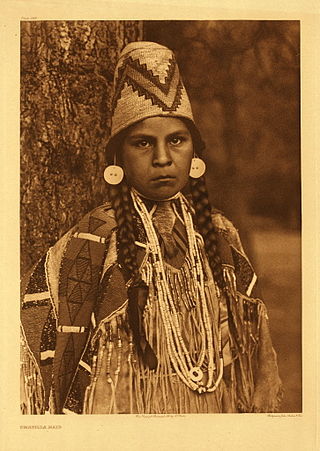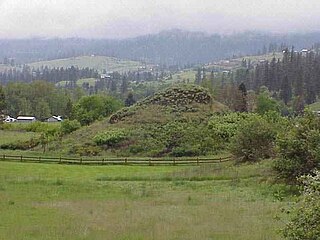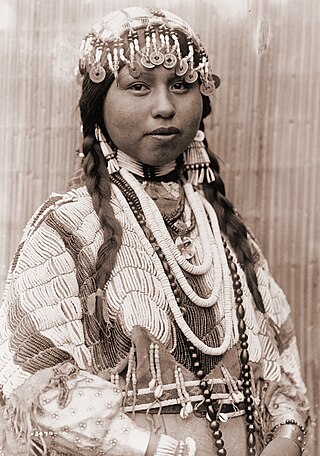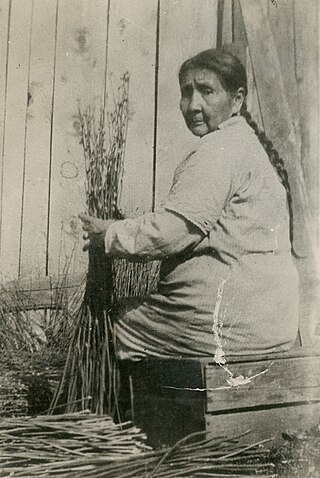Related Research Articles

Chinookan peoples include several groups of Indigenous people of the Pacific Northwest in the United States who speak the Chinookan languages. Since at least 4000 BCE Chinookan peoples have resided along the upper and Middle Columbia River (Wimahl) from the river's gorge downstream (west) to the river's mouth, and along adjacent portions of the coasts, from Tillamook Head of present-day Oregon in the south, north to Willapa Bay in southwest Washington. In 1805 the Lewis and Clark Expedition encountered the Chinook Tribe on the lower Columbia.

The Warm Springs Indian Reservation consists of 1,019 square miles (2,640 km2) in north-central Oregon, in the United States, and is governed by the Confederated Tribes of Warm Springs.
The Siletz were the southernmost of several divisions of the Tillamook people speaking a distinct dialect; the other dialect-divisions were: Salmon River on the Salmon River, Nestucca on Little Nestucca River, Nestucca River and Nestucca Bay, Tillamook Bay on the Tillamook Bay and the mouths of the Kilchis, Wilson, Trask and Tillamook rivers, and Nehalem on Nehalem River. The name "Siletz" comes from the name of the Siletz River on which they live. The origin of the name is unknown

The Kalapuya are a Native American people, which had eight independent groups speaking three mutually intelligible dialects. The Kalapuya tribes' traditional homelands were the Willamette Valley of present-day western Oregon in the United States, an area bounded by the Cascade Range to the east, the Oregon Coast Range at the west, the Columbia River at the north, to the Calapooya Mountains of the Umpqua River at the south.

The Chinookan languages are a small family of extinct languages spoken in Oregon and Washington along the Columbia River by Chinook peoples. Although the last known native speaker of any Chinookan language died in 2012, the 2009-2013 American Community Survey found 270 self-identified speakers of Upper Chinook.
The Multnomah are a tribe of Chinookan people who live in the area of Portland, Oregon, in the United States. Multnomah villages were located throughout the Portland basin and on both sides of the Columbia River. The Multnomah speak a dialect of the Upper Chinookan language in the Oregon Penutian family.

The Umatilla are a Sahaptin-speaking Native American tribe who traditionally inhabited the Columbia Plateau region of the northwestern United States, along the Umatilla and Columbia rivers.

Indigenous peoples of the Northwest Plateau, also referred to by the phrase Indigenous peoples of the Plateau, and historically called the Plateau Indians are Indigenous peoples of the Interior of British Columbia, Canada, and the non-coastal regions of the Northwestern United States.
The Molala are a Native American people of Oregon that originally resided in the Western Cascades. There are few recorded sources about the Molala, the majority being unpublished manuscripts. This assortment includes the works of Albert S. Gatschet, Franz Boas, Leo J. Frachtenberg, Philip Drucker, Melville Jacobs, and Leslie Spier.

The Confederated Tribes of the Grand Ronde Community of Oregon (CTGR) is a federally recognized tribe of Indigenous peoples of the Northwest Plateau. They consist of at least 27 Native American tribes with long historical ties to present-day western Oregon between the western boundary of the Oregon Coast and the eastern boundary of the Cascade Range, and the northern boundary of southwestern Washington and the southern boundary of northern California.

Serrano is a language in the Serran branch of the Uto-Aztecan family spoken by the Serrano people of Southern California. The language is closely related to Tongva, Tataviam, Kitanemuk and Vanyume, which may be a dialect of Serrano. Serrano has free word order with the only rule being that verbs usually come last.
Kathlamet (Cathlamet) was a Chinookan language that was spoken around the border of the U.S. states of Washington and Oregon by the Kathlamet people. The most extensive records of the language were made by Franz Boas, and a grammar was documented in the dissertation of Dell Hymes. It became extinct in the 1930s and there is little text left of it.
David Heath French was an American anthropologist and linguist from Bend, Oregon. During his lifetime he was considered the foremost academic authority on the Chinookan people of the middle Columbia River, especially the Wasco-Wishram Chinooks of the Warm Springs Indian Reservation in Oregon. His research focused on ethnobotany and language.

The Wasco-Wishram are two closely related Chinook Indian tribes from the Columbia River in Oregon. Today the tribes are part of the Confederated Tribes of Warm Springs living in the Warm Springs Indian Reservation in Oregon and Confederated Tribes and Bands of the Yakama Nation living in the Yakama Indian Reservation in Washington.
Wishram may refer to:

The Confederated Tribes of Warm Springs is a federally recognized Native American tribe made of three tribes who put together a confederation. They live on and govern the Warm Springs Indian Reservation in the U.S. state of Oregon.

The Tenino people, commonly known today as the Warm Springs bands, are several Sahaptin Native American subtribes which historically occupied territory located in the North-Central portion of the American state of Oregon. The Tenino people included four localized subtribes — the Tygh or "Upper Deschutes" divided in Tayxɫáma, Tiɫxniɫáma and Mliɫáma, the Wyam (Wayámɫáma) (Wayámpam) or "Lower Deschutes", also known as "Celilo Indians", the Dalles Tenino or "Tinainu (Tinaynuɫáma)", also known as "Tenino proper"; and the Dock-Spus (Tukspush) (Takspasɫáma) or "John Day."
Billy Chinook was a chief and member of the Wasco tribe. Chinook was a guide for John C. Frémont and Kit Carson, who explored Central Oregon from 1843 to 1844 and from 1845 to 1847. Chinook also served as First Sergeant, U.S. Army Wasco Scouts during the Snake War. Lake Billy Chinook in Oregon is named in his honor.
Lower Chinook is a Chinookan language spoken at the mouth of the Columbia River on the west coast of North America.

Victoria Howard, also Victoria (Wishikin) Wacheno Howard, was a Clackamas Chinook storyteller from Oregon, USA. She was a Molala, Clackamas, and Tualatin citizen of the Confederated Tribes of the Grand Ronde Community of Oregon.
References
- 1 2 Kristian Foden-Vencil (2012-07-17). "Last Fluent Speaker Of Oregon Tribal Language 'Kiksht' Dies". Oregon Public Broadcasting. Archived from the original on 2019-10-10. Retrieved 2013-02-26.
- ↑ Bureau, US Census. "Detailed Languages Spoken at Home and Ability to Speak English for the Population 5 Years and Over: 2009-2013". Census.gov. Retrieved 2024-09-01.
- ↑ Leonard, Wesley Y.; Haynes, Erin (December 2010). "Making "collaboration" collaborative: An examination of perspectives that frame linguistic field research". Language Documentation & Conservation. 4: 269–293. hdl:10125/4482. ISSN 1934-5275.
- ↑ Culture: Language. The Confederated Tribes of Warm Springs Reservation of Oregon. 2009 (retrieved 9 April 2009)
- ↑ "Lewis & Clark—Tribes—Wasco Indians". National Geographic. Archived from the original on December 22, 2002. Retrieved 2013-02-25.
- ↑ Last Fluent Speaker of Kiksht Dies
- ↑ "Honors Confederated Tribes of Warm Springs elder Gladys Miller Thompson for her contribution to preserving Native languages of Oregon". 74th OREGON LEGISLATIVE ASSEMBLY--2007 Regular Session. Retrieved 2013-02-26.
- ↑ "Zelma Smith, 1926-2010". Spilyay Tymoo, Coyote News, the Newspaper of the Warm Springs Reservation. Retrieved 2013-02-25.
- ↑ Keith Chu (2006-07-30). "New speakers try to save language". The Bulletin. Bend, OR. Retrieved 2013-02-25.
- ↑ Joanne B. Mulcahy (2005). "Warm Springs: A Convergence of Cultures" (Oregon History Project). Retrieved 2013-02-26.
- ↑ Aaron Clark. "USA: Tribes Strive to Save Native Tongues". GALDU, Resource Centre for the Rights of Indigenous Peoples. Retrieved 2013-02-26.
- ↑ Nariyo Kono. "Conversational Kiksht". Endangered Languages Archive. Retrieved 2013-02-25.
- ↑ "Holy road: Speaker of Wasco language dead at 91 - Indian Country Media Network". indiancountrymedianetwork.com. Retrieved 2017-05-24.